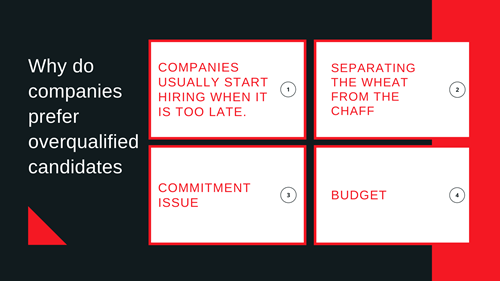
Software Development Engineering Hiring Truth: They All Want Young But Experienced Programmers?
All businesses around the world have already started a digital transformation. The Software Development Outsourcing & IT market is bustling with thousands of new developers entering daily.
The paradox
Probably any freshly graduated 22 years old ask themselves this question: “Why do big companies want recent graduates with an unreasonable number of years experience that is not possible for young people to have?”
Malcolm Gladwell, an English-born Canadian journalist, public speaker, and author, explained in his book ‘Outliers’ about the 10,000-hour-rule: anyone can become an expert in any field by allocating 10,000 hours to practice. For example, a teenager Bill Gates, who had nothing but a passion for programming, spent more than 10,000 hours in computer programming since high school before establishing Microsoft. By the time he was a freshman in college, he was way past 10,000 hours.
Averagely, it takes us up to 10,000 hours to become an expert, four years of practicing with an average of 8 hours per day. But that is not necessarily the case for an ordinary student who rarely has an opportunity to obtain 10,000 hours practicing before graduating standing in front of her/him like Gates.
In this case, we’d like to talk about young software developers (of course, this struggle happens to all fresh graduates in all industries, and the insights are malleable to fit each case: most companies share the same thoughts when it comes to hiring new employees).
To have an experience for an entry-level job in programming, young developers need to start coding by age five. Is this even possible? Of course not! But is this the reality that all companies want 5-year-experience young dev? To some extent, this might be the truth. 
Thousands of companies are posting ads for entry-level positions searching for people in their early 20s, but with an average seasoned programmer experience. Young talents end up feeling discouraged from applying for such jobs and passing up opportunities because they think they’re not qualified. But in fact, the working position can be perfect for their skill.
But why are many companies obsessed with overqualified candidates? Or they just “appear to be” so?
The answer varies for several reasons, which we think are very compelling. Let’s dig in and find out why they prefer young, but experienced software development engineers.
Companies usually start hiring when it is too late.
This is the typical case. Frankly speaking, many companies start their hiring process when they realize the project they’re working on is bigger than they thought it would, or sometimes after some experienced senior developers began to turn in their resignation. This scenario even happens in top software development outsourcing companies. Therefore, it’s easy to understand why they want to recruit young people who can make a longer commitment while having the right skill set to start work immediately.
It is a common sense that experienced people acclimate to their new jobs faster with less training. Even though that is not the safe bet, it happens on numerous occasions enough that key decision-makers would like to try their luck at these odds.
Separating the wheat from the chaff.
Putting high experience requirements in job ads is one way for job recruiters to have a qualified shortlist of several high skilled developers. Although this tactic might discourage talented applicants, the HR department can distinguish valuable and suitable candidates without wasting time and effort.
You can have a young programmer with extensive knowledge of JavaScript, Java, C#, C+ on board in one second. Still, in another second, you can also encounter someone calls themselves programmers because they use HTML (you’ll never know).
If one company posts a job ad that states one specific position requires people with 0 - 1 years of experience, what kind of talent do you think that company’s going to attract? Most of what one candidate will be doing will be taught by their line managers and by the company. So five years of experience with company X won’t guarantee excellent performance at company Y.
But overstating the amount of experience the job actually requires will help in selecting eligible candidates.
But as we said, this tactic is quite risky, and one of its biggest cons is that many top software development outsourcing companies can discard many young talents despite the fact that they might be suitable for the position more than an experienced programmer.
It all relates to the commitment issue.
The experience is also some sort of reflection of one’s commitment to the job.
Job hopping - this is no longer a myth that young people prefer changing companies every year or two of their own volition. Reason? Well, Bill Driscoll, New England district president of Accountemps, revealed that almost 42 percent of the workers in the U.S think that job-hopping brings benefits to their career. However, if viewing from the human resources managers’ perspective, a worker with a pattern of five job changes in ten years raises some red flags.
Even though job-hopping has lost some of its stigmas, HR recruiters still look at the experience in other jobs (especially those that last more than one or two years, this depends on the companies’ working cultures) to define if one candidate will turn out to be a strong team player or a temporary team member.
Just like the previous tactic, this one is not 100 percent accurate but works most of the time.
It all comes down to one thing: budget.
We can’t speak for all companies and certainly can’t represent them, but this is often the main reason behind the paradox of wanting young and experienced software developers.
This is somewhat a smart tactic, we might say.
Imagine one freshly graduated student start looking for a job with an average of three to six months of internship and other miscellaneous working experience not related to his/her study (like being a retail worker, barista, waitress, etc). All jobs s/he finds require four to five years of experience. But s/he applies anyway, and when s/he gets an interview call, s/he thanks God that s/he’s lucky enough to get a chance. Now s/he makes it through the first two rounds, and when it comes to salary, s/he lowballs the wages even though s/he is actually a perfect fit for the job. Why? Because the graduate feels that s/he is not qualified enough since the job posted that they want people with more experience or higher qualifications.
The company’s starting wages are $75,000 annually, but now they only pay her/him $50,000. They might be able to save $20,000!
But what’s up with the young talent? The work of finding young talent is like finding a needle in a haystack.
Now, to back the recruiter up a bit, we have to say, finding young talents nowadays is extremely hard. That is why they have to come up with this artificial scarcity. Sometimes, even the most talented talent acquisition specialists can’t tell highly potential but no experience candidates apart just by looking at their resumes. That account is not strong enough to make a judgment. Sometimes, lying in those blank resume is a richer story waiting to be told.
Lots of potential software engineers have done many personal projects, however, they don’t find those worth and look well on their resumes. Freshly graduates often lack experience in writing resumes.
Technologies approach when interviewing - killing two birds with one stone
With the help of advanced technologies like Artificial Intelligence, Machine Learning, Data Analytics, many top software development companies in Vietnam and around the world can finally fulfill both side’s needs: companies who want to search out excellent candidates and non-experience young people need good chances.
The good news is: more and more companies have already stopped using traditional assessment methods.
Many companies have opted to use take-home coding tests for interviewees, some of the insights recruiters can gain about candidates through the take-home coding challenge are:
- How the potential employees can approach the problem
- What method they are using
- What they do when they get stuck
- etc.
NOTE TO RECRUITERS: Do not take the take-home coding test too far, or else you will end up with a test that only people who work for you can solve. Define your goals and what skills you’re going to assess.
Some companies have chosen to use point systems for the first round of resume assessing with job experience being just one of many factors that affecting the score.
Whether they are experienced or non-experienced, candidates can show off their accomplishments by attaching a portfolio with some nifty projects they’ve done.
Recruiters should also keep in mind that “skills can be taught but the character you either have or you don’t” (Anthony Bourdain). Have a look at the young candidates’ volunteering experience, the small assignment they have successfully completed, their part-time job, which can possibly reflect their quality.
This applies to not only IT graduates but also in other study fields. For example, a communication student who worked part-time as a chef for 4 years probably develops more or less multiple soft skills that are essential for a cook: taking criticism well, excellent time management, stress management, pay attention to detail, decisiveness under pressure.
Conclusion
We hope we have helped young software developers to gain some insight about why companies often want young people with outstanding years of experience and give recruiters some ideas about how to find talents for their companies.
As we’re all entering the digital time of our life, advanced technologies allow us to find out the real talents and overcome the old paradox of young experienced programmers. This hypothesis will soon be a thing of a past.



